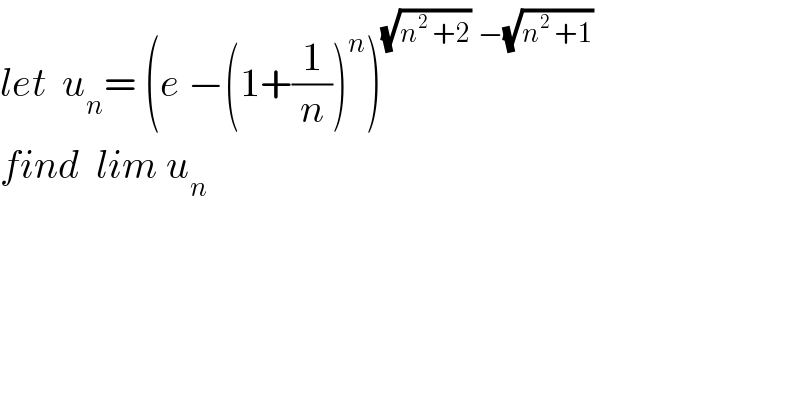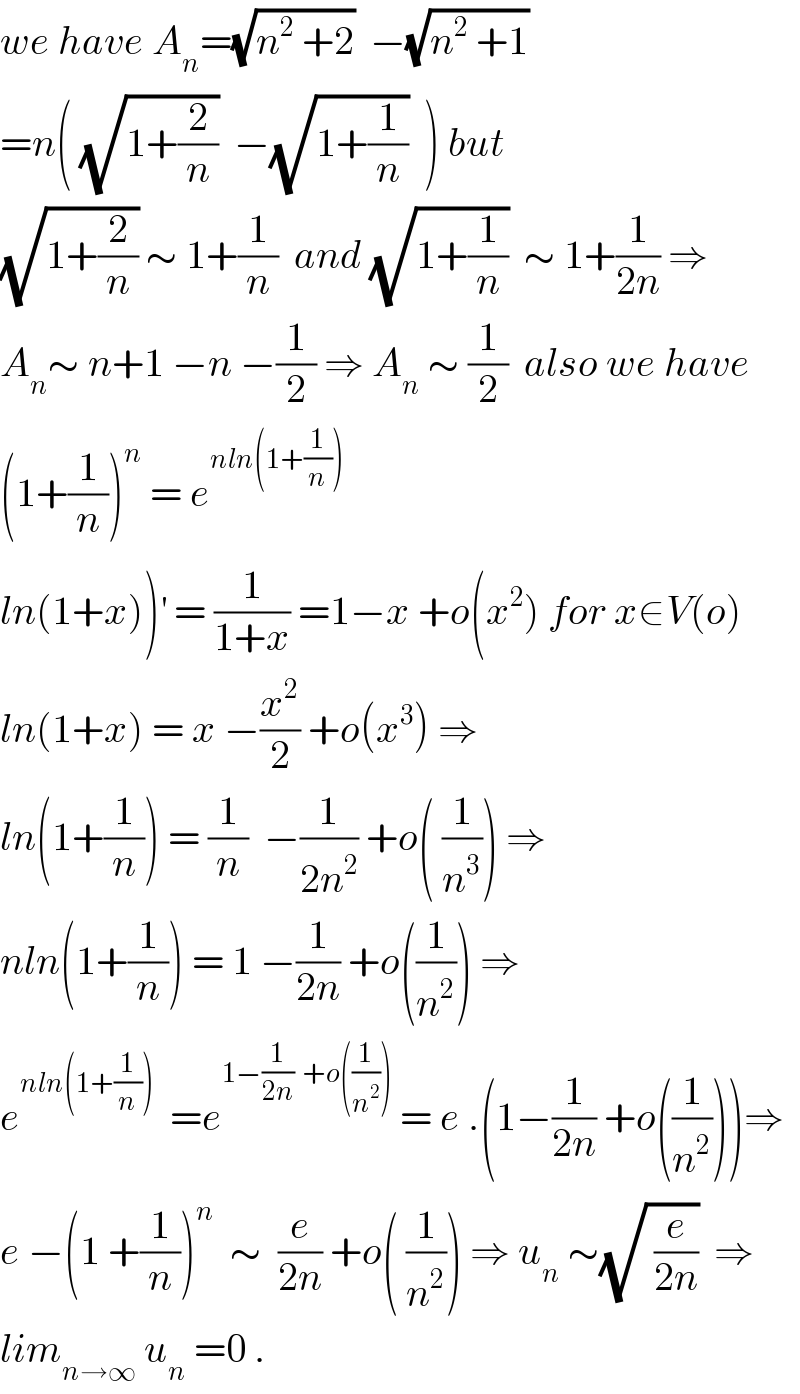Question Number 32364 by prof Abdo imad last updated on 23/Mar/18

$${let}\:\:{u}_{{n}} =\:\left({e}\:−\left(\mathrm{1}+\frac{\mathrm{1}}{{n}}\right)^{{n}} \right)^{\sqrt{{n}^{\mathrm{2}} \:+\mathrm{2}}\:\:−\sqrt{{n}^{\mathrm{2}} \:+\mathrm{1}}} \\ $$$${find}\:\:{lim}\:{u}_{{n}} \\ $$
Commented by prof Abdo imad last updated on 06/Apr/18

$${we}\:{have}\:{A}_{{n}} =\sqrt{{n}^{\mathrm{2}} \:+\mathrm{2}}\:\:−\sqrt{{n}^{\mathrm{2}} \:+\mathrm{1}} \\ $$$$={n}\left(\:\sqrt{\mathrm{1}+\frac{\mathrm{2}}{{n}}}\:\:−\sqrt{\mathrm{1}+\frac{\mathrm{1}}{{n}}}\:\:\right)\:{but} \\ $$$$\sqrt{\mathrm{1}+\frac{\mathrm{2}}{{n}}}\:\sim\:\mathrm{1}+\frac{\mathrm{1}}{{n}}\:\:{and}\:\sqrt{\mathrm{1}+\frac{\mathrm{1}}{{n}}}\:\:\sim\:\mathrm{1}+\frac{\mathrm{1}}{\mathrm{2}{n}}\:\Rightarrow \\ $$$${A}_{{n}} \sim\:{n}+\mathrm{1}\:−{n}\:−\frac{\mathrm{1}}{\mathrm{2}}\:\Rightarrow\:{A}_{{n}} \:\sim\:\frac{\mathrm{1}}{\mathrm{2}}\:\:{also}\:{we}\:{have} \\ $$$$\left(\mathrm{1}+\frac{\mathrm{1}}{{n}}\right)^{{n}} \:=\:{e}^{{nln}\left(\mathrm{1}+\frac{\mathrm{1}}{{n}}\right)} \\ $$$$\left.{ln}\left(\mathrm{1}+{x}\right)\right)^{'} \:=\:\frac{\mathrm{1}}{\mathrm{1}+{x}}\:=\mathrm{1}−{x}\:+{o}\left({x}^{\mathrm{2}} \right)\:{for}\:{x}\in{V}\left({o}\right) \\ $$$${ln}\left(\mathrm{1}+{x}\right)\:=\:{x}\:−\frac{{x}^{\mathrm{2}} }{\mathrm{2}}\:+{o}\left({x}^{\mathrm{3}} \right)\:\Rightarrow \\ $$$${ln}\left(\mathrm{1}+\frac{\mathrm{1}}{{n}}\right)\:=\:\frac{\mathrm{1}}{{n}}\:\:−\frac{\mathrm{1}}{\mathrm{2}{n}^{\mathrm{2}} }\:+{o}\left(\:\frac{\mathrm{1}}{{n}^{\mathrm{3}} }\right)\:\Rightarrow \\ $$$${nln}\left(\mathrm{1}+\frac{\mathrm{1}}{{n}}\right)\:=\:\mathrm{1}\:−\frac{\mathrm{1}}{\mathrm{2}{n}}\:+{o}\left(\frac{\mathrm{1}}{{n}^{\mathrm{2}} }\right)\:\Rightarrow \\ $$$${e}^{{nln}\left(\mathrm{1}+\frac{\mathrm{1}}{{n}}\right)} \:\:={e}^{\mathrm{1}−\frac{\mathrm{1}}{\mathrm{2}{n}}\:\:+{o}\left(\frac{\mathrm{1}}{{n}^{\mathrm{2}} }\right)} \:=\:{e}\:.\left(\mathrm{1}−\frac{\mathrm{1}}{\mathrm{2}{n}}\:+{o}\left(\frac{\mathrm{1}}{{n}^{\mathrm{2}} }\right)\right)\Rightarrow \\ $$$${e}\:−\left(\mathrm{1}\:+\frac{\mathrm{1}}{{n}}\right)^{{n}} \:\:\sim\:\:\frac{{e}}{\mathrm{2}{n}}\:+{o}\left(\:\frac{\mathrm{1}}{{n}^{\mathrm{2}} }\right)\:\Rightarrow\:{u}_{{n}} \:\sim\sqrt{\:\frac{{e}}{\mathrm{2}{n}}}\:\:\Rightarrow \\ $$$${lim}_{{n}\rightarrow\infty} \:{u}_{{n}} \:=\mathrm{0}\:. \\ $$
